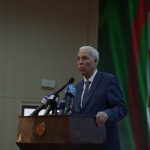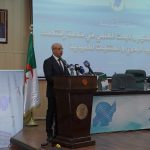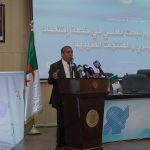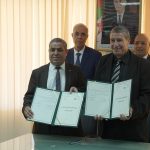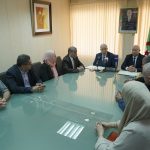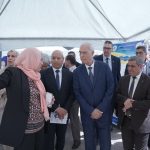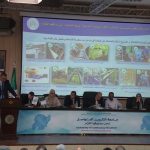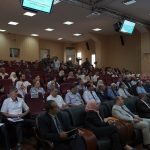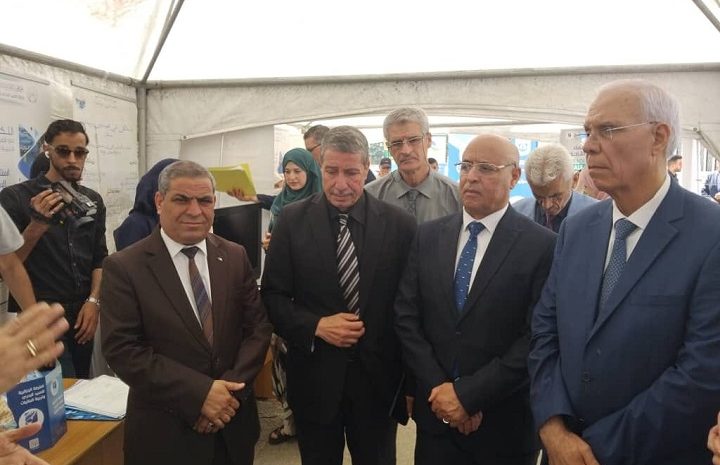
A specialized national symposium titled « Training and Scientific Research in the Service of the Fisheries Economy and Aquaculture »
Continuous Training University
Media and Communication Cell
Specialized National Symposium titled « Training and Scientific Research in the Service of the Fisheries Economy and Aquaculture »
On Thursday, June 6, 2024, the Continuous Education University organized a specialized national symposium titled « Training and Scientific Research in the Service of the Fisheries Economy and Aquaculture. » The symposium was attended by the Secretary-General of the Ministry of Higher Education and Scientific Research, Professor Abdelhakim Ben Telis, and the Secretary-General of the Ministry of Fisheries and Fishery Resources, Professor Mohamed Ben Garina. Framework cooperation agreements were signed between the Ministry of Higher Education and Scientific Research and the Ministry of Fisheries and Fishery Resources, as well as between the Continuous Education University and the Directorate of Research, Training, and Extension of the Ministry of Fisheries and Fishery Resources.
On this occasion, Mr. Ben Telis emphasized the importance of cooperation between the two ministries in implementing the objectives of the public authorities, led by the President of the Republic, in the field of food security, a strategic axis in his presidential commitments. Mr. Ben Garina stressed the need to create a stimulating economic environment based on training, scientific research, and innovation, a specialized training area undertaken by higher education and scientific research institutions.
In this context, the agreement signed between the two parties relies on the expertise of the Continuous EducationUniversity in the field of training, as it offers an educational environment that aligns with skill and knowledge development both in-person and remotely. The university can play a key role in providing specialized educational programs and continuous training courses aimed at enhancing the capabilities of workers in the fisheries sector. To strengthen coordination between the two ministries, the sectors agreed to create a knowledge space compatible with the training needs expressed by various stakeholders, showcasing and valuing the latest developments in education, training, scientific, and technological research related to the fisheries economy and fishery products.
The national symposium saw the attendance of many organizations, institutes, and laboratories specialized in fisheries and aquaculture, aiming to introduce the various coordination capabilities between the sectors and involve stakeholders in the training and research dynamics, which will positively reflect on the fisheries and aquaculture economy and the knowledge economy. The Continuous EducationUniversity can develop advanced training programs and postgraduate studies aimed at improving workers’ skills and enhancing their abilities to face current and future challenges in this vital sector.
In his opening speech, the Rector of the Continuous EducationUniversity, Professor Yahia Djafari, highlighted that since its inception, the university has registered over a million students, with approximately 200,000 graduates. Additionally, the university has participated in the training of more than 400,000 employees from various sectors. In relation to the agreement’s implementation, several bachelor’s and professional master’s training programs linked to the fisheries and aquaculture profession are expected to be launched. These include professional bachelor’s degrees in freshwater aquaculture, fishing navigation science, marine aquaculture, and marine electromechanics.
Specialists and experts’ presentations during the symposium focused on the importance of this partnership. Professor Harwadi Farid, Inspector General of the Ministry of Fisheries and Fishery Products, presented the sector’s vision for the development of fisheries and aquaculture towards 2030. He mentioned expansion projects planned by the sector, including the upcoming shift to deep-sea fishing for the first time, which requires equipment and training aligned with technological needs for working in these challenging areas. The sector aims to double production to exceed 200,000 tons annually by 2030.
The event also included a visit to an exhibition on the sidelines, showcasing various intervention fields in fisheries and aquaculture professions and the training capabilities offered by the Continuous EducationUniversity for the economic and social environment. Additionally, presentations by professors and experts from both sectors focused on the characteristics of distance learning that can be leveraged for the fisheries sector and the opportunities it offers for expanding fisheries and aquaculture projects.


